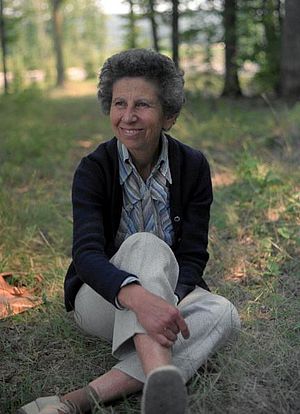Emma Castelnuovo Award
The Emma Castelnuovo Award recognizes outstanding achievements in the practice of mathematics education. The Award was established in 2013 by the ICMI EC to reflect the ICMI principles to “development of mathematical education at all levels” and “to promote the reflection, collaboration, exchange and dissemination of ideas on the teaching and learning of mathematics, from primary to university level,". The award is named after the Italien mathematics educator, born in 1913 to celebrate her 100th birthday and honour her pioneering work.
The first Emma Castelnuovo medal was awarded to Hugh Burkhardt and Malcolm Swan in 2016 at the 13th International Congress on Mathematical Education (ICME-13) in Hamburg, Germany.
Announcement of the Awardee of the 2024 Emma Castelnuovo Award
The recipient of the award was announced and presented at ICME-15 in July 2024 in Sydney, Australia.
About Emma Castelnuovo

Emma Castelnuovo (12 December 1913 – 13 April 2014) was an Italian mathematician, daughter and niece of two famous Italian mathematicians, Guido Castelnuovo and Federigo Enriques, respectively. She graduated from the University of Rome in 1936 with a thesis on algebraic geometry. In 1938, when Italy passed new laws preventing Jews from holding state positions, she was fired from Rome University. After the Second World War ended, she decided to become a secondary school teacher until her retirement in 1979. In parallel, she committed herself to research and development of learning materials in mathematics education, which inspired many students, teachers and fellow educators. She was deeply influenced by her father and uncle and also by educators and psychologists such as Maria Montessori and Jean Piaget. Her pedagogical vision was based on encouraging young children and students to use observation, visualization, fantasy and imagination before any formalization. She encouraged students to use concrete objects, to experiment, to puzzle over unexpected outcomes and eventually to arrive at previously unknown results, without being told. She also stimulated looking at daily life phenomena through mathematical eyes. She published in the first volume of Educational Studies in Mathematics and presented at the first ICME in Lyon (1969) and at the third ICME in Karlsruhe (1976). Her international collaborations included the French network IREM, UNESCO, teaching school children in Niger, her involvement with many ICMI activities and she deeply influenced mathematics education in Italy and Spain.
In honor of her contributions and impact, ICMI decided to name the Award for Excellence in the Practice of Mathematics Education in her name on the occasion of her 100th birthday in 2013.
The 2024 Emma Castelnuovo Award Committee
Professor Emerita Helen Forgasz was nominated by the President of ICMI as Chair of the 2024 Emma Castelnuovo Award Committee. There are five other members of the Committee. They remain anonymous until their time on the Committee comes to an end. The six Committee members come from six different countries, and represent different world regions.
The work of the Emma Castelnuovo Award Committee is confidential.
Eligibility and Criteria for nominations
The award is open to an individual/small team of individuals from across the mathematics education community, with the exception of:
- current ICMI Executive Committee members
- current members of the Emma Castelnuovo Award Committee
- previous winners of the award.
The Emma Castelnuovo Award honours an individual, or a small team of individuals, for work in the development and implementation of exceptionally excellent and influential work in the practice of mathematics education related to one or more of the following:
- classroom teaching
- curriculum development
- instructional design (of materials or pedagogical models)
- teacher education programmes, and/or
- field projects
with a demonstrated influence on schools, districts, regions, or countries.
The Emma Castelnuovo Award seeks to recognize and encourage efforts, ideas, and the successful implementation of mathematics teaching and learning, as well as to showcase models and exemplars of inspirational practices.
Criteria for evaluating nominations
Nominations for the Emma Castelnuovo Award will be evaluated in light of the following criteria:
- the educational rationale for the work of the individual/small team of individuals, and what served as a catalyst for that work
- the mathematics teaching/learning problem/s addressed by the individual/small team of individuals
- the role/s of the individual/small team of individuals in addressing the problem/s and opportunities, whether they involve curriculum development, pre-service teacher education, in-service professional development/learning, instructional design, field projects, or other areas of mathematics education practice
- the conditions under which the work has taken place, that is, the cultural and political context, infrastructure, funding support, and people involved
- the originality and creativity of the work, the approaches taken to address the identified mathematics teaching/learning problem/s, the design and development process, and the products/outcomes of the work
- the extent and quality of networking with key stakeholders (e.g., in bridging theory and practice)
- evaluations of the work
- the extent of the influence/impact of the work on educational practice in the teaching/learning of mathematics, including quantitative or qualitative evidence of that influence
- the potential of the work to serve as a model, either for inspiring others addressing similar problems, or because an approach was taken that could be applied elsewhere with appropriate modifications.
Nominations for the 2024 award are not possible anymore (the deadline was 30.November 2022).
A new call for nominations for the 2028 Award will be opened in 2025/2026.